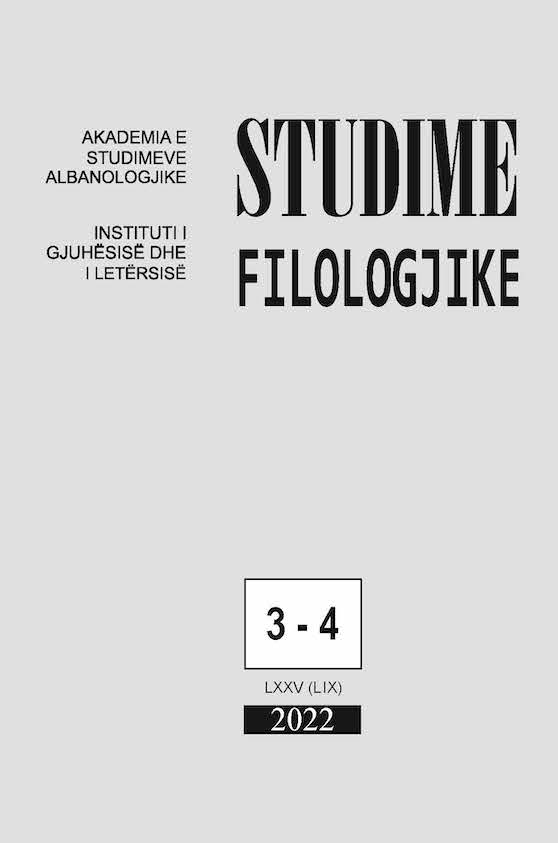Përtej aljamiados: tekstet shqipe letrare të traditës islame me alfabet grek (Vijon nga numri paraardhës)
Beyond Aljamiado: Albanian Texts of the Islamic Tradition in Greek Script (Continued from previous issue)
Author(s): Fatos DibraSubject(s): Islam studies, Historical Linguistics, Sociolinguistics, 19th Century, Philology
Published by: Qendra e Studimeve Albanologjike
Keywords: Albanian literature of the Islamic tradition; Bektashi literature; Albanian texts with Greek writing; Bektashism; sociolinguistics of text graphics; written culture;
Summary/Abstract: In the present article the author puts forward some results of an ongoing work on some manuscripts in Albanian, Greek, Turkish and Arabic religious texts written in Greek script by Albanian Bektashi authors. The focus of the study are the Albanian texts of the manuscripts, as part of the Albanian literature of the Islamic tradition. This scribal practice of using the Greek script for Islamic texts at the first wight represents an “aberration” as it “violates” the accepted formula of ‘religion-script relation’ in the Ottoman literary context, according to which a Muslim writer/author, used only the Arabic script, and this was the case particularly for the Islamic religious texts. The phenomenon deserves a specific attention because it constitutes examples of the scribal practices not considered sufficiently (except in the work of the present author) in studies on the literary and writing tradition of Albanian Muslim authors, namely the writing of Albanian texts with Islamic religious content produced in the second half of the 19th century, using a script other than Arabic. The phenomenon has been studied previously relying mainly on a single source, which constitutes also the most interesting example known to date, as its texts are written using both Greek and Arabic script. This article presents some of the conclusions reached mainly from the study on six Albanian Bektashi manuscripts in Greek script (as well as the mentioned manuscript in Greek and Arabic script) of some Bektashi authors/scribes from South of Albania. For a better understanding of the place and the importance of our manuscripts, and more particularly of the Albanian texts they contain, for the history of the Albanian literature, the following matters are considered: 1. In the first part the article gives an overview of the problems related to the study of the Albanian texts of the Islamic tradition of the Ottoman period, such as: a. the terminology used for Albanian literature of the Islamic tradition and its place within the history of the Albanian literature; b. the question of the Albanian Bektashi literature as part of Albanian literature of the Islamic tradition; c. the issue of periodization and classification of the literature of the Bektashi tradition; d. the writing practices of Muslim Albanians. 2. In the second part, there is a presentation of Bektashi manuscripts with Greek writing written by Albanian Bektashi and the more specific problems related to them. At the beginning, an assessment is made about the social and cultural conditions that have enabled the birth of such a writing/literary practice and about the place that this phenomenon should have occupied in the space of literature and Albanian letters of the century. XIX, especially in the context of the Islamic literary tradition. Then some data on the time, place, authors, and content of the manuscripts are presented. Attention is also paid to the possible relation between the texts, trying to highlight some similarities and differences between the literary material in question. The study reached so far, the following conclusions: The use of Greek script for the writing Islamic religious texts by the Albanian Bektashis is far from being a sporadic case. As a matter of fact, it constitutes a phenomenon. This phenomenon was related to the cultural, religious, and educational processes that took place during the Ottoman period, in a much wider context than the Albanian one. At the current stage, we do not have enough data to definitively determine the time and area, as well as the volume of Albanian texts and literary works of the Islamic tradition that were written according to this scheme. The phenomenon in question, in its complexity, needs further investigations. On the other hand, it makes necessary a new approach to the history of Albanian literature in general, and to the Albanian literature of the Islamic tradition in particular.
Journal: Studime Filologjike
- Issue Year: 2022
- Issue No: 03-04
- Page Range: 51-86
- Page Count: 36
- Language: Albanian

